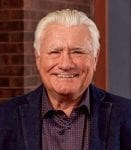Steven Soos’ frustration boiled over as he described last Tuesday’s virtual meeting of Niagara Region’s Public Health and Social Services Committee, at which he and Niagara Falls City Councillor Wayne Campbell presented a motion to invoke a formal state of emergency in Niagara related to mental health, addiction, and homelessness.

The committee opted to go with an alternative motion put forward by Fort Erie Regional Councillor Tom Insinna, and seconded by Rob Foster, Regional Councillor for Lincoln. In what Soos and Campbell consider a “watered-down motion,” the Region officially “acknowledged” that a “significant crisis” exists in Niagara in regard to these issues, but stopped short of declaring a state of emergency.
Soos disagrees vehemently with the nomenclature in the motion.

“They can't accomplish the goal with this motion,” he said. “Changing the words from ‘emergency’ to ‘crisis,’ and ‘declare’ to ‘acknowledge,’ doesn't guarantee any immediate funding. In my motion for the state of emergency, the province is legislated that they must respond. They passed a watered-down motion from what we were offering, one that acknowledges a crisis, but not a state of emergency. Do you know what ‘acknowledgement’ does? It does nothing,” lamented Soos.
Insinna’s motion instructed Regional Chair Jim Bradley to send advocacy letters to the appropriate federal and provincial ministries, and for staff to prepare reports and updates related to the health crisis.
Insinna told the Niagara Falls Review that there is “nothing of substance” that goes with a state of emergency declaration, and said his motion will effectively “reach out to those in the province who hold the purse strings.” He further said that declaring a state of emergency on the collective issues of homelessness, mental health and addiction “would be an injustice and detraction from each issue.”
Soos begged to differ.
There would be no cost to the Region, because in a state of emergency situation, the province is responsible for the procurement funding
“Councillor Insinna should familiarize himself with emergency management legislation, because he's totally incorrect in this situation. He also said additional powers are not granted when calling for the state of emergency. But the municipality gets increased procurement bylaws through a state of emergency, so he's not on the ball here. And I would appreciate if he corrected himself before spreading that as the message to the public.”
It wasn’t an ask for money, said Soos.
“There would be no cost to the Region, because in a state of emergency situation, the province is responsible for the procurement funding.”
Soos expressed frustration that the Region’s top official did not champion the original motion.
“Chair Bradley has the power here…why he's so openly against it is a mystery to me. I'll leave him to explain that.”
Campbell voiced similar sentiments in a conversation with the Voice.
“Both Steven and I were taken aback during the meeting, and somewhat flabbergasted that this was put before us,” he said. “Clearly, there was some politicking behind the scenes. My sense is that a lot of politicians make decisions based on what's best for getting re-elected.”
Insinna’s proposal, a “counter motion,” had been prepared in advance of the meeting, said Campbell.
The issue is a personal one for Campbell, whose own daughter’s mental health struggles culminated in her suicide in 2013.
Several years ago, Campbell said he attempted to convince the provincial government to create a ministry of mental health. There are 13 ministries, all of which are funded in different ways in dealing with mental health. He maintains it would not cost the taxpayer any additional monies.
“[The ministries] are all working in silos. I got so many deaf ears…I didn't get anywhere with it.”
In a Facebook post, Campbell reviewed the statistics on mental health, homelessness and addiction in Niagara, which he called “damning.” Statistics Canada data shows that Niagara’s self-harm and suicide rates exceed the provincial average, while information on the Region’s own website reports that in 2019, 14.2 percent of secondary students in Niagara had “seriously considered suicide” in the prior 12 months.
Overdose deaths have also increased, with Niagara’s Emergency Medical Services (EMS) reporting 625 suspected overdoses in 2020, up from 499 in 2019. In 2021, 55 overdoses have already been logged in the region. Campbell indicated that according to his latest information, 625 Niagara residents (including 144 children) are recorded as being homeless.
“How many more people need to experience these problems before Regional government supports the initial motion to declare a state of emergency on mental health, homelessness and addiction?,” he asked.
Pelham Mayor Marvin Junkin felt strongly that the Region should have “followed the will” of the 11 lower-tier municipalities which unanimously voted in favour of the motion to declare a state of emergency in Niagara regarding these issues.
“The numbers speak for themselves as to the urgency of the situation,” said Junkin.
At Regional Council’s meeting on Thursday, a decision will be made to support either the original Soos-Campbell motion, or the alternative motion offered by Insinna and Foster.


